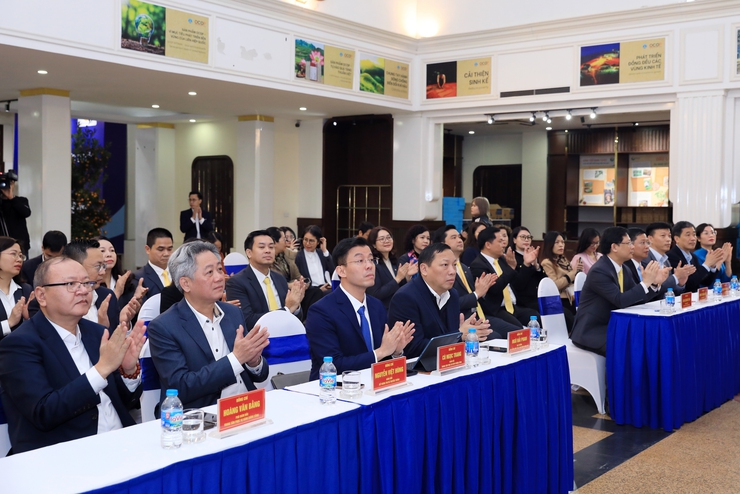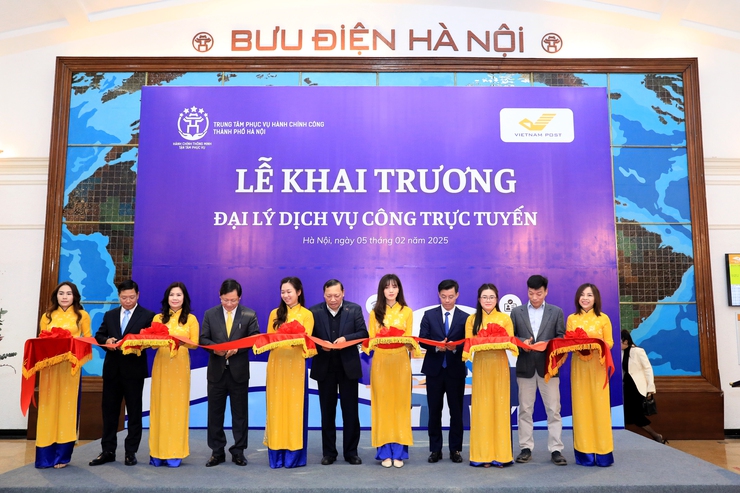Speaking at the ceremony, Director of the Hanoi Public Administrative Service Center Cu Ngoc Trang stated that the pilot model of online public service agencies represents a groundbreaking solution with significant implications for the socio-economic development of the capital. This initiative marks an important step in the implementation of Resolution No. 57-NQ/TW of the Politburo, which outlines the national digital transformation strategy until 2030, with a vision toward 2045. Digital transformation is not only an inevitable trend but also a key, continuous task in modernizing public administration.

Delegates at the event.
Resolution 57-NQ/TW emphasizes the role of digital government, digital economy, and digital society, with online public services serving as a crucial pillar to enhance state management efficiency, reduce bureaucratic administrative procedures, and save time and costs for both citizens and businesses.
The launch of online public service agencies within post offices is a practical solution that helps realize the objectives of Resolution 57 by bringing public services closer to the people, especially vulnerable groups, those unfamiliar with digital technology, and residents in remote areas. Instead of having to visit administrative offices in person, citizens can now go to the nearest post office to receive assistance in accessing public services conveniently, quickly, and efficiently.
Cu Ngoc Trang also noted that the online public service agency model marks a significant advancement in building e-government, promoting administrative reforms, and improving service efficiency for citizens and businesses. Furthermore, the model plays an essential role in preventing corruption and misconduct by reducing direct contact between the public and government officials.
The implementation of online public service agencies aligns with the policy of socializing public services, as outlined in Resolution No. 18/NQ-TW, issued on October 25, 2017, by the Sixth Plenum of the 12th Central Committee of the Communist Party of Vietnam. This initiative helps streamline the administrative apparatus and enhances the efficiency of the public sector. "The Hanoi Public Administrative Service Center, along with its partners, reaffirms its commitment to close cooperation and support for citizens, organizations, and businesses, aiming for sustainable, modern, and efficient public administration," Cu Ngoc Trang emphasized.

Delegates at the event.
The objective of the online public service agency model in Hanoi is to develop an extensive network of agencies, allowing citizens and businesses to access administrative services quickly, easily, and conveniently. At post offices designated as online public service agencies, postal staff will assist and advise the public on procedures, requirements, and necessary documents for processing administrative tasks online.
Additionally, postal employees will guide individuals and organizations on how to track their applications, make online payments, and navigate digital services. In cases where individuals lack the means or capability to complete the procedures themselves, postal staff will provide free assistance in executing public services on their behalf.
Notably, once administrative procedures are completed, postal employees will ensure that the processed documents are delivered quickly and securely to the addresses specified by the applicants. This service helps save time and travel expenses while also reducing traffic congestion and carbon emissions in Hanoi.
Currently, 100 percent of Hanoi Post Office staff have undergone intensive training on the procedures and protocols for submitting and processing online administrative applications. At post offices, postal employees will provide thorough guidance to citizens at every step, ensuring smooth and efficient transactions. The promotion of online public service agencies also contributes to digital transformation efforts, supports the development of digital government, and increases the rate of administrative procedures handled online. The goal is to have 80 percent of citizens using online public services by 2025 while alleviating the burden on state administrative agencies and optimizing societal resources by delegating certain public administration tasks to enterprises.
The introduction of this model will enable Hanoi to achieve the "Three No's" and "Two No's" objectives: no geographical restrictions, no intermediaries, no physical paperwork, no administrative counters, and no procedural bottlenecks.
Delivering directives at the ceremony, Ngo Hai Phan, Director of the Administrative Procedure Control Department under the Government Office, highlighted that this initiative is the result of collaborative efforts to create services that benefit the people of the capital. He also expressed his hope that the initial 30 public services will be sustainably expanded and enhanced, ensuring a welcoming approach to citizens, an open-minded attitude in processing requests, and an effective resolution of public needs. The goal is to introduce even more online public services in the future.
"I hope that the successful implementation of the 32 agencies will make Hanoi a leading example in offering citizens and businesses an improved public service experience, oriented toward a government that truly serves the people," Ngo Hai Phan emphasized.